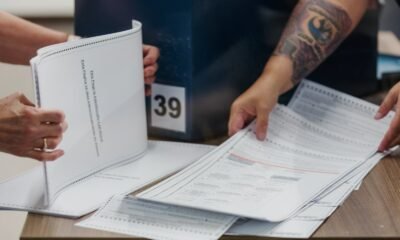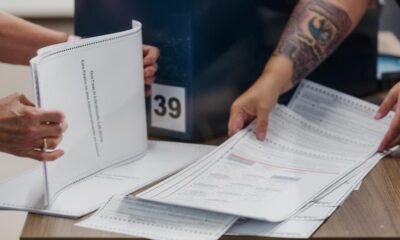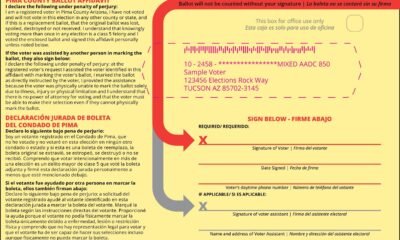Adrian Fontes
Cochise County’s Election Results Voided Due to Mail-Ballot Error

An Arizona judge has permitted Cochise County officials to discard the results of a recent tax election, citing a procedural error that detracted from its validity. This decision follows claims from challengers that the county violated state law regarding voter eligibility in a specific type of election.
The contentious election, held in May 2023, aimed to fund a new jail via an all-mail ballot. An earlier ruling by the Arizona Court of Appeals determined that the county failed to send ballots to approximately 11,000 inactive voters, a requirement for local taxing district elections. Visiting Judge Michael Latham of the Cochise County Superior Court deemed the supervisors’ intention to hold a new election both reasonable and legal.
Although Latham’s ruling did not formally annul the election, it enables the county supervisors to pursue a settlement with those contesting the results. This settlement stipulates an immediate halt to tax collection until a new vote is conducted.
Latham emphasized that the appeals court had already ruled the election flawed due to disenfranchisement of a significant number of voters. He indicated that rescheduling the election offers a logical resolution to the case.
The Court of Appeals and Supreme Court had tasked Latham with examining whether the exclusion of inactive voters could have influenced the election’s outcome, though this consideration became moot as settlement discussions progressed.
This upcoming revote may stand as a unique instance in Arizona, as legislative amendments following previous rulings explicitly exempt counties from sending ballots to inactive voters. House Bill 2129, signed by Governor Katie Hobbs on May 13, received bipartisan support from legislators.
Challenges to election results over procedural inaccuracies have risen nationwide, with various high-profile cases under scrutiny. However, courts seldom mandate new elections without clear evidence that such discrepancies affected electoral outcomes.
In Arizona, a history of election-related litigation persists. High-profile challenges, like that of gubernatorial candidate Kari Lake in 2022, have generally been dismissed due to lack of compelling evidence. One notable exception was a judge’s order for a redo in a Maricopa County school board election, which ultimately did not take place due to candidate withdrawals.
In this case, Cochise County’s new supervisors shifted their stance on the tax election, initially defending its results. Instead, they sought Latham’s approval to negotiate a settlement with residents, effectively punting the issue to voters once again.
Secretary of State Adrian Fontes’s attempt to intervene in the settlement was rejected by Latham. Legal experts have voiced concern over the implications of such agreements, stating that they could set troubling precedents in future election disputes.
The settlement not only suspends the jail tax—already generating over $10 million—but also outlines a new election for November. The proposed ballot will feature a jail tax with a revised structure favored by current supervisors.
The residents who initiated the lawsuit, including lead plaintiff Daniel LaChance, hailed the ruling as a step toward electoral justice. Their attorney commended Latham’s decision, hoping state officials will refrain from appealing.
However, public opinion remains split. Some, like Bisbee resident Tami Birch, argue that the original election results should stand, citing urgent safety concerns related to the county’s aging jail facilities. Birch expressed frustration, asserting that prompt use of tax funds is essential to remedy hazardous conditions.


















